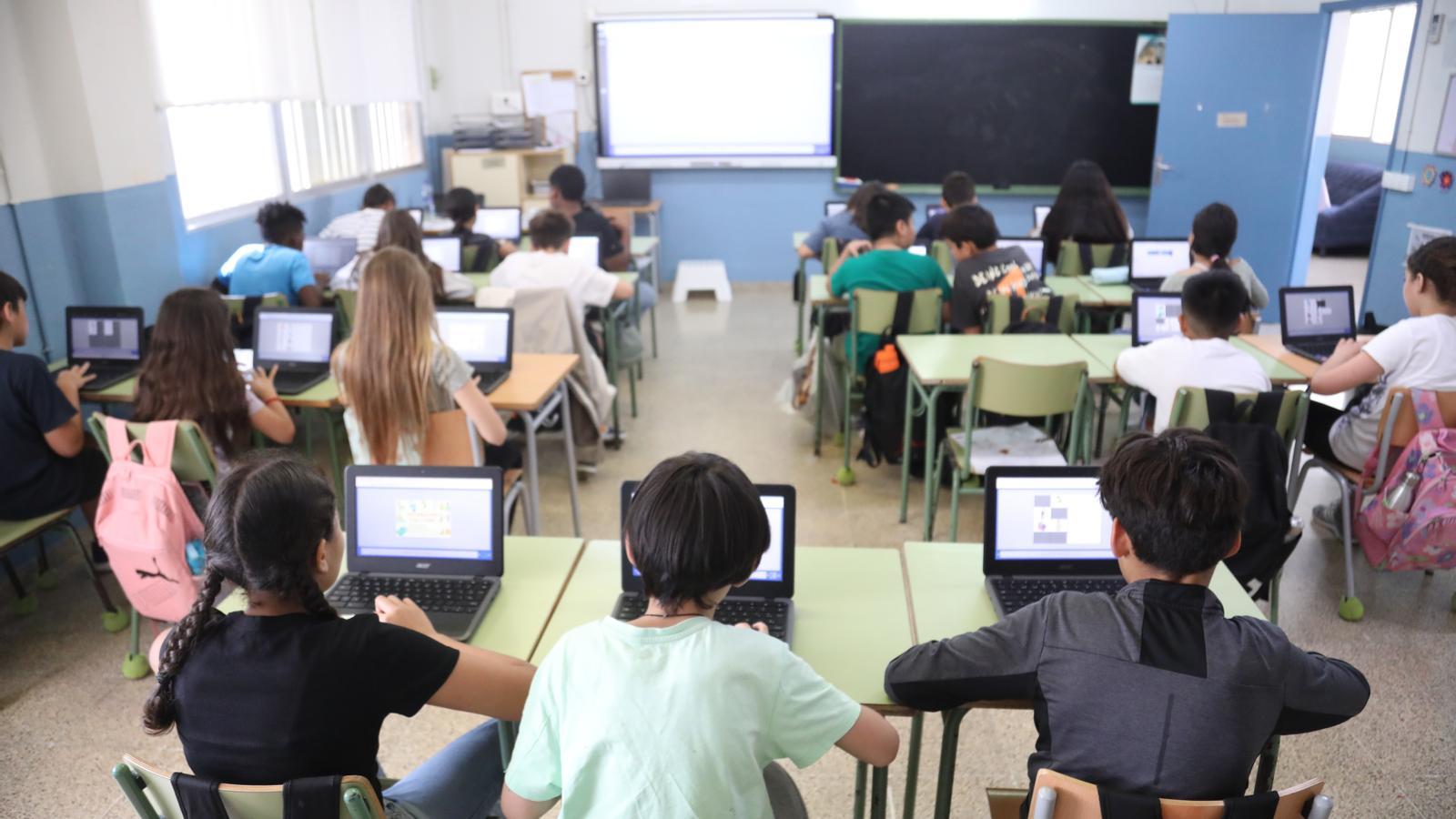The open fronts (and challenges) of the 2025-2026 academic year
A new year begins with consolidated shortcomings, such as the aging of infrastructure and the decline of Catalan in the classroom.


PalmThe 2025-2026 school year begins with important developments. This includes new educational curricula, the ban on cell phones, and the regulation of screens, among others. However, not everything is new. There are open areas that impact the dynamics of schools and which should be addressed to improve educational quality and, thus, aim to improve academic results and the well-being of families, teachers, and students. We analyze these areas and outline some of the challenges for the new year with representatives of the educational community.
More investment in education
This year, the Ministry of Education is managing a budget of €1.41 billion, 4.7% more than the previous year. Despite this increase, the needs of the education system in terms of infrastructure, air conditioning, teacher shortages, and the need to strengthen schools with specific professional profiles require, according to experts, greater funding. "We are at figures that represent 3.6% of GDP, but an additional provision of the Balearic Islands Education Law (LEIB) is being violated, which states that it should progressively increase to 5%," says Antoni Salvà, coordinator of the Professional Association of Teachers. According to him, while support for state-funded schools has increased, support for public schools has decreased, where many of the difficulties, both social and infrastructural, are concentrated. For Salvà, the challenge for the new academic year is to strive to provide the education system with sufficient resources to address the aforementioned weaknesses.
Infrastructure renovation
In August 2024, the Regional Minister of Education pledged to invest 600 million euros over 10 years to build 77 new centers and renovate and expand 218, among other measures. A year later, actions have begun, but it doesn't seem possible to achieve his goal. In any case, during this decade, more buildings will still become obsolete and will have shortcomings that will need to be addressed. In general, the educational real estate stock in the Balearic Islands is old and, furthermore, has aged poorly, due to the fact that, according to the sources consulted, construction was carried out with inferior materials and without a long-term perspective. During the 2025-2026 academic year, we will have to see how the Infrastructure Plan is implemented, now under the direction of the new Ibisec manager, Maria Belén Lloret. She is the third person to assume the position in this term.
Air conditioning, urgent
Climate change is advancing, and schools are getting hotter and hotter. "It starts to become unbearable in mid-June and sometimes lasts until October. There are some privileged schools that have fans, but not all," says Joana Maria Mas, president of the Association of Early Childhood and Primary School Principals of Mallorca (Adipma). "The air conditioning pilot plan, which will reach 19 schools, is good, but it is urgent that a path be taken to reach all of them. Not everything is a major project. What needs to be done now is to replace the windows and install air conditioning," she says. It should be noted that the Minister of Education, Antoni Vera, did not venture to say when the interventions would have been carried out in the 19 centers included in the Plan. Meanwhile, in the Balearic Islands, there are more than 200 schools and more than 70 secondary schools. Many have some deficiency in insulation and air conditioning.
Dignifying the teaching role
There is a shortage of professionals, something that already compromises the quality of education, with schools sometimes experiencing a shortage and unable to fill it because there is no one on the temporary staff lists. But the problem goes further. In the 2025 teaching competitions, only 55% of the positions have been filled, according to data from the SIAU union.
The situation in secondary education is also worrying. The Balearic Islands are the region with the most vacancies: 53.24%, 30 points higher than the national average of 23.48%. "We must work so that teachers can work in good conditions and to dignify the teaching profession, about which everyone has an opinion without knowing," explains Salvà. "Social recognition is needed, but also a commitment to ongoing training. Professionals need time to design intervention spaces adapted to the educational environment. And now, many don't have that time," she says.
Addressing vulnerability
According to data provided by the School Council of the Balearic Islands, nine out of ten students with educational needs drop out of school when they move on to high school. Therefore, the highest representative body is calling for an increase in specialized staff. It must be kept in mind, explains the school president, that the majority of newly arrived students have needs and require specific attention, which is why he sees the need to increase support staff. Xavier Ferriol is the president of the Mallorcan Federation of Families (FAPA), but he is also a Therapeutic Pedagogist (PT). "We are seeing more and more children with Special Needs (NESE) and Special Needs (NEE). I speak with teachers and they tell me there are more cases of ASD, ADHD... There are not enough staff to care for them properly," he says. "Despite this context, the students' right to be in a regular classroom must be respected," he adds.
Promoting school in Catalan
The situation of Catalan in the classroom is complicated. Professionals confirm this, but so do the data. In the IAQSE tests for the 2012-2013 academic year, 59% of fourth-grade students achieved an adequate level. Twelve academic years later (2023-2024), only 49% did so. In the case of second-grade students, the drop was from 64% passing in the 2016-2017 academic year (the last edition of the ESO test) to 59% in 2023-2024. "An urgent shock project is needed to thoroughly develop the language integration plans provided for in the Education Law, to promote the inclusion of families," says Salvà. "There are schools that probably don't even comply with the minimum standards decree, which the Inspectorate knows and will have to monitor, just as it monitors whether schools have respected the right to choose the language in the fourth year of Preschool," adds the president of Adipma.
Lowering ratios, improving results
That the academic results of students in the Balearic Islands, compared to other autonomous communities, are not good is an objective reality. However, the islands have external and extreme factors that are decisive and tip the scales. For example, the vulnerability of the students means that the classroom ratios, although not maximum in many cases, make it difficult to provide adequate attention to everyone. "The challenge we face, once again this year, is to be able to reach everyone and do so with the same resources as in previous years," explains Mas.
As she points out, it's no longer just the number of students per class, which may seem adequate, but also the fact that there is a high percentage of children with needs, both with a diagnosis and others who come from countries where they have not had continuous schooling. "If we don't receive more support and the ratios are not lowered, academic results will increasingly worsen, and it will be difficult to fight to compensate for inequalities," states the principal.
